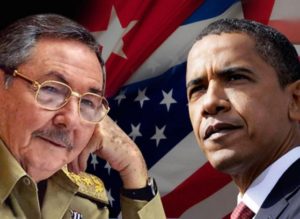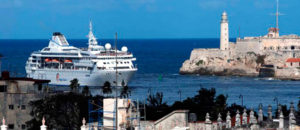“To Raúl Castro you can get fast. Find out how to reach Barack Obama. I paid for the trips,” were the words that Pope Francisco said to Cardinal Jaime Ortega, as recalled by the Cuban during the presentation of his book this Wednesday in Madrid .
Ortega also explained that his volume ‘Encuentro, dialogue and agreement’ is not intended to “tell the facts, but to pay homage to Francisco.” “I wanted this book to be a tribute to the pope, who is a victim of so much criticism,” Ortega said.
He also said that he would not make any further advances in the volume.
“Without these three men, Pope Francisco, Obama and Raul Castro, would never have given this agreement,” he concluded.
The prelate stated that to tell what happened during the melting and the approach of the governments of Washington and Havana would have made of his book another thing: “fictional genre or quasi-police.”
The Spanish diplomat Miguel Ángel Moratinos, Felipe González Abad (consultant to the United Nations and the World Tourism Organization) and Cardinal Carlos Amigo Vallejo, archbishop emeritus of Seville, participated in the ceremony at Casa America Espanola.
For his part, Miguel Ángel Moratinos referred to what he called “a new stage of reforms in Cuba” that includes “advances” such as the creation and work of the Jaime Ortega Foundation and the Félix Varela Center. He also affirmed the will of the Government of Spain to help the island in its “new stage”. He said that he himself advised US authorities on the way forward with Havana: “There was only one possible policy with Cuba: that of dialogue and cooperation.” Moratinos also entertained Ortega and said that his book “reflects what every good diplomat should aspire to.”
“The world has opened up little by little. There are more embassies in Havana than in Mexico City. The world has opened up to Cuba. ”
“This opening was necessary, because before the isolation was shown from one country to another,” said Archbishop Emeritus Ortega.
“The Pope wanted a dialogue between two people, leaving aside the Cuban and American governments.”
“With the arrival of Trump, Cuba is at least aware that it wants to maintain the agreement and wants to maintain the dialogue.” “It is necessary to wait, at the moment Trump is going to visit the Pope, and the subject of Cuba can be something that can be tried again and it is important and necessary that they maintain good relations” concluded Monseñor Jaime Ortega.
On the changes announced by Washington on Tuesday by the Trump Administration, he conjectured that “maybe what he wants (the president) is to eliminate the blockade.”
Cardinal Ortega in previous months has made several revelations about intergovernmental dialogue. Among other things, Ortega said Colonel Alejandro Castro Espín, the son of General Raúl Castro, represented the government in the secret negotiations that led to the historic meltdown and that the date chosen (December 17, 2014) to communicate to the world his decision To reestablish diplomatic relations was a tribute for the birthday of Pope Francis.
On Wednesday morning at an information breakfast in Madrid, organized by Nueva Economía Foro, the cardinal said Wednesday that he does not believe that there is a “slowdown” in the Washington-Havana dialogue with the presidency of Donald Trump and bet for ” Continue with the opening “in the Island, although he acknowledged that it is being done” with a bit of slowness. ”
He also considered that the political dialogue in Venezuela is “very difficult” due to the climate of violence that the country is experiencing, but insisted on “calling for conciliation”.
Historia del deshielo entre EEUU y Cuba. El Papa, Obama, Castro y el Cardenal Ortega.
“A Raúl Castro puedes llegar rápido. Búscate la manera de llegar a Barack Obama. Yo pago los viajes”, fueron las palabras que el papa Francisco dijo al cardenal Jaime Ortega, según rememoró el cubano durante la presentación de su libro este miércoles en Madrid.
Ortega, además, explicó que su volumen Encuentro, diálogo y acuerdo no tiene como propósito “relatar los hechos, sino hacer un homenaje a Francisco”. “Quise que este libro fuera un homenaje al papa, que es víctima de tantas críticas”, puntualizó Ortega.
Asimismo, señaló que no haría otros adelantos del volumen.
“Sin estos tres hombres, el papa Francisco, Obama y Raúl Castro, no se habría dado nunca este acuerdo”, concluyó.
El prelado afirmó que contar lo sucedido durante el deshielo y el acercamiento de los gobiernos de Washington y La Habana habrían hecho de su libro otra cosa: “género novelesco o cuasi policíaco”.
“El mundo se ha abierto poco a poco. Hay más embajadas en La Habana que en Ciudad de México. El mundo se ha abierto a Cuba”. “Esta apertura era algo necesario, porque antes se mostraba el aislamiento de un país a otro” ha asegurado el arzobispo emérito Ortega.
“El Papa pretendía un diálogo entre dos personas, dejando a un lado los gobiernos cubano y estadounidense”.
Sobre los cambios que anunció Washington este martes que realizará la Administración Trump, conjeturó que “a lo mejor lo que quiere (el mandatario) es eliminar el bloqueo”.
“Con la llegada de Trump, Cuba por lo menos está concienciada de que quiere mantener el acuerdo y desea mantener el diálogo”. “Hay que esperar, de momento Trump va a visitar al Papa, y el tema de Cuba puede ser algo que se puede tratar de nuevo y es importante y necesario que se mantengan buenas relaciones” ha concluido Monseñor Jaime Ortega.
En el acto en la Casa América Espanola participaron el diplomático español Miguel Ángel Moratinos, Felipe González Abad (consultor de Naciones Unidas y de la Organización Mundial del Turismo) y el cardenal Carlos Amigo Vallejo, arzobispo emérito de Sevilla.
Por su parte, Miguel Ángel Moratinos se refirió a lo que catalogó de “una nueva etapa de reformas en Cuba” que incluye “avances” como la creación y el trabajo de la Fundación Jaime Ortega y el Centro Félix Varela. Además, afirmó la voluntad del Gobierno de España de ayudar a la Isla en su “nueva etapa”. Contó que él mismo aconsejó a autoridades de EEUU en cuanto al camino a seguir con La Habana: “Solo había una política posible con Cuba: la del diálogo y la cooperación”. Moratinos también agasajó a Ortega y señaló que su libro “refleja lo que todo buen diplomático debe aspirar”.
El cardenal Ortega en meses anteriores ya hizo varias revelaciones sobre el diálogo intergubernamental. Entre otras cosas, Ortega dijo que el coronel Alejandro Castro Espín, hijo del general Raúl Castro, representó al Gobierno en las negociaciones secretas que condujeron al histórico deshielo y que la fecha elegida (el 17 de diciembre de 2014) para comunicar al mundo su decisión de restablecer relaciones diplomáticas fue un homenaje por el cumpleaños del papa Francisco.
En la mañana de este miércoles en un desayuno informativo en Madrid, organizado por Nueva Economía Foro, el cardenal afirmó este miércoles que no cree que haya un “frenazo” en el diálogo Washington-La Habana con la presidencia de Donald Trump y apostó por “continuar con la apertura” en la Isla, aunque reconoció que se está haciendo “con un poco de lentitud”.
Consideró, además, que el diálogo político en Venezuela es “muy difícil” por el clima de violencia que vive el país, pero insistió en “llamar a la conciliación”.
Agencies/DDC/Extractos/Internet Photos/La Tarde/ Arnoldo Varona/ TheCubanHistory.com
THE CUBAN HISTORY, HOLLYWOOD.



 > THE THAW between U.S. and Cuba: the Pope, Obama, Castro and Cardinal Ortega. + EL DESHIELO entre EEUU y Cuba: El Papa, Obama, Castro y el Cardenal Ortega.
> THE THAW between U.S. and Cuba: the Pope, Obama, Castro and Cardinal Ortega. + EL DESHIELO entre EEUU y Cuba: El Papa, Obama, Castro y el Cardenal Ortega.




